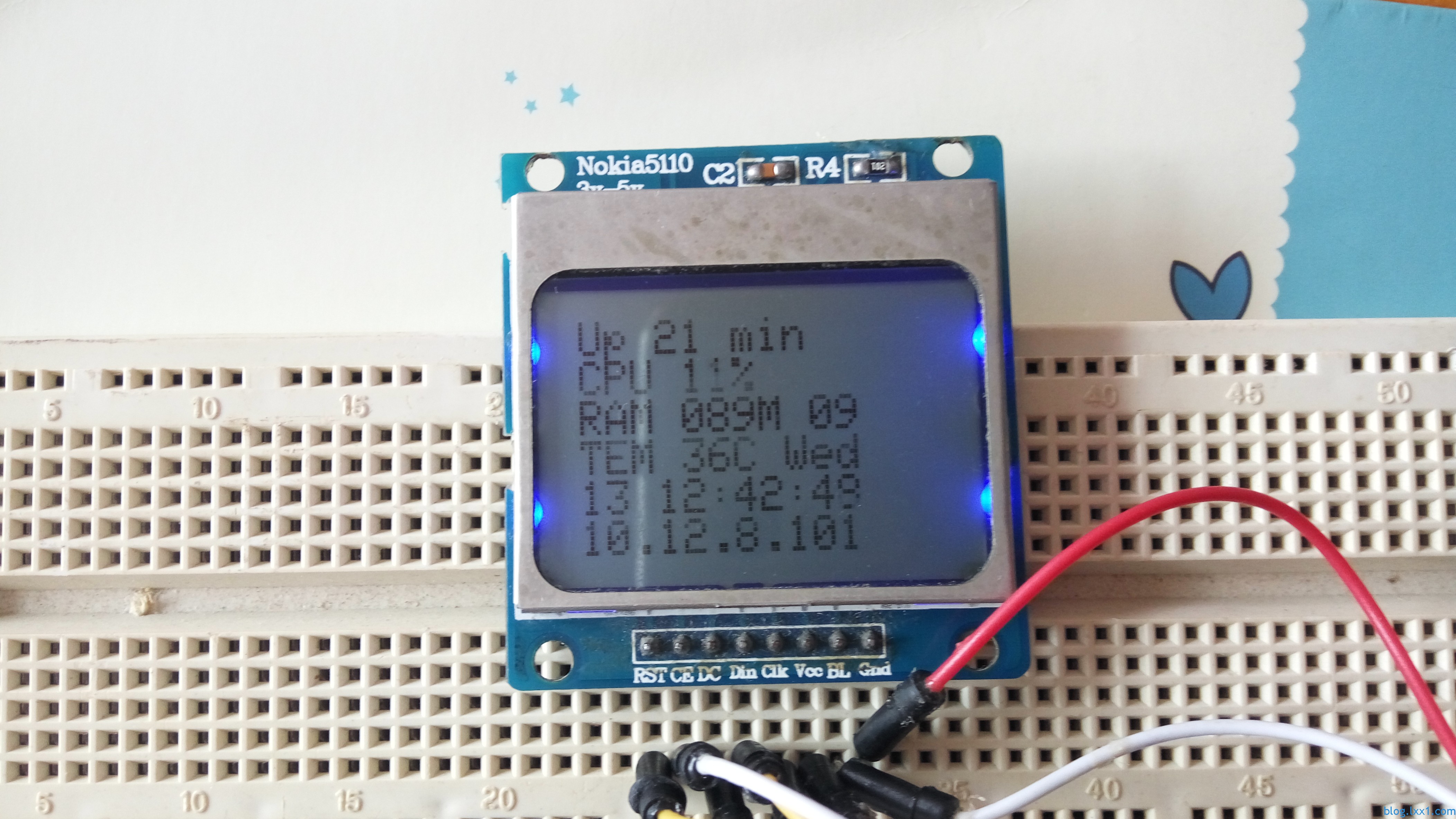一、为什么要加显示屏
树莓派可以看作一台计算机,具有HDMI接口,可以连接到显示器上,但是如果我们不用树莓派的图形界面,经常使用SSH远程登录来管理树莓派,那么就没有必要来使用显示器。在SSH远程登录时,如果树莓派使用的动态ip地址,那么每次登录都需要去路由器上查看树莓派的ip地址,非常的不方便,在前面的文章中,我们可以听到树莓派的ip地址,教程在这儿: 。如果我们希望通过更加直观的方式来查看树莓派的ip地址,那么我们可以为树莓派添加一个显示屏,来显示当前的ip地址,同时也可以显示树莓派的时间、内存占用、系统负载等信息。
关于树莓派显示屏的选用,可以选择的有LCD1602、LCD12864、Nokia5110等,由于LCD1602、LCD12864占用的IO口较多,并且LCD1602显示字符较少,而Nokia5110占用的IO口只有4个,同时能够显示足够多的字符,所以选择Nokia5110作为树莓派信息显示的显示屏。
二、Nokia5110显示屏介绍
Nokia5110显示屏价格较为低廉,在网上可以轻松的买到,在购买时推荐购买显示屏模块。方便在树莓派上使用。模块的图片如下图。
Nokia5110显示屏有8个引脚,引脚介绍如下:
RST:外部复位引脚
CE:显示屏使能引脚
DC:数据/命令引脚
Din:串行数据输入端
CLK:串行时钟输入端
Vcc:电源引脚
BL: 亮度调节
Gnd:地
Nokia5110显示屏与树莓派连接,以下gpio编号使用wiringPi编号。
RST、——21
CE——22
DC——23
Din——24
CLK——25
Vcc——28
BL——29
Gnd——0V
连接电路如下图:

实物连接图:
四、Nokia显示程序
wget http://www.tujing.site/wp-content/uploads/2016/07/nokia510.zip unzip nokia510.zip cd nokia510
其中PCD8544.c为Nokia5110显示屏的驱动文件,PCD8544.h为驱动文件的头文件,我们主要看下显示程序pcd8544_rpi.c,主要程序和注释如下。
/*
=================================================================================
Name : pcd8544_rpi.c
Version : 0.1
Copyright (C) 2012 by Andre Wussow, 2012, desk@binerry.de
Description :
A simple PCD8544 LCD (Nokia3310/5110) for Raspberry Pi for displaying some system informations.
Makes use of WiringPI-library of Gordon Henderson (https://projects.drogon.net/raspberry-pi/wiringpi/)
*/
#include <wiringPi.h>
#include <stdint.h>
#include <stdio.h>
#include <stdlib.h>
#include <string.h>
#include <time.h>
#include <sys/sysinfo.h>
#include "PCD8544.h"
//devin modify
#include <sys/types.h>
#include <sys/stat.h>
#include <fcntl.h>
#include <sys/ioctl.h>
#include <sys/socket.h>
#include <arpa/inet.h>
#include <netinet/in.h>
#include <net/if.h>
#define TEMP_PATH "/sys/class/thermal/thermal_zone0/temp"
#define MAX_SIZE 32
#define NETWORK_FILE "/etc/network/interfaces"
// 引脚连接
int _din = 24;
int _sclk = 25;
int _dc = 23;
int _rst = 21;
int _cs = 22;
int _vcc = 28;
int _bl = 29;
// 对比度调节,根据屏幕亮度选择
//may be need modify to fit your screen! normal: 30- 90 ,default is:45 !!!maybe modify this value!
int contrast = 30;
time_t timep;
struct tm *p;
char *wday[] = {"Sun","Mon","Tue","Wed","Thu","Fri","Sat"};
char get_temp(void);
char* getip(char* ip_buf);
char* get_temp2(void);
int min,hour,sec,mday;
char week;
struct tm *localtime(const time_t *timep);
int main(void)
{
// 打印程序运行信息
printf("Raspberry Pi Nokia5110 sysinfo display\n");
printf("========================================\n");
// 检查wiringPi是否启动
if (wiringPiSetup() == -1)
{
printf("wiringPi-Error\n");
exit(1);
}
// 初始化Nokia并且清楚显示
LCDInit(_sclk, _din, _dc, _cs, _rst, _vcc, _bl, contrast);
LCDclear();
// 显示树莓派Logo
LCDshowLogo();
delay(2000);
for (;;)
{
// 清楚屏幕显示
LCDclear();
//获得当前时间
char timeInfo[16];
time(&timep);
p=localtime(&timep);
mday=p->tm_mday;
min=p->tm_min;
week=p->tm_wday;
hour=p->tm_hour;
sec=p->tm_sec;
sprintf(timeInfo, "%d %d:%d:%d",mday,hour,min,sec);
// 获得 system usage / info
struct sysinfo sys_info;
if(sysinfo(&sys_info) != 0)
{
printf("sysinfo-Error\n");
}
// 启动时间
char uptimeInfo[15];
unsigned long uptime = sys_info.uptime / 60;
sprintf(uptimeInfo, "Up %ld min", uptime);
// CPU占用
char cpuInfo[10];
unsigned long avgCpuLoad = sys_info.loads[0] / 1000;
sprintf(cpuInfo, "CPU %ld%%\r", avgCpuLoad);
// 内存使用量及占用
char ramInfo[10];
unsigned long totalRam = sys_info.totalram / 1024 / 1024;
unsigned long freeRam = sys_info.freeram /1024 /1024;
unsigned long usedRam = totalRam - freeRam;
unsigned long ram_load = (usedRam * 100) / totalRam;
sprintf(ramInfo, "RAM %.3dM %.2d", usedRam,ram_load);
// 树莓派温度
char tempInfo[10];
sprintf(tempInfo, "TEM %.2dC %s", get_temp(),wday[week]);
//IP 信息
char ipInfo[16];
getip(ipInfo);
//开始显示
LCDdrawstring(0, 0, uptimeInfo);
LCDdrawstring(0, 8, cpuInfo);
LCDdrawstring(0, 16, ramInfo);
LCDdrawstring(0, 24, tempInfo);
LCDdrawstring(0, 32, timeInfo);
LCDdrawstring(0, 40, ipInfo);
LCDdisplay();
delay(1000);
}
return 0;
}
//decin modify
char get_temp(void)
{
int fd;
double temp = 0;
char buf[MAX_SIZE];
// 打开/sys/class/thermal/thermal_zone0/temp
fd = open(TEMP_PATH, O_RDONLY);
if (fd < 0) {
fprintf(stderr, "failed to open thermal_zone0/temp\n");
// 关闭文件
close(fd);
return -1;
}
// 读取内容
if (read(fd, buf, MAX_SIZE) < 0) {
fprintf(stderr, "failed to read temp\n");
// 关闭文件
close(fd);
return -1;
}
// 转换为浮点数打印
temp = atoi(buf) / 1000.0;
// 关闭文件
close(fd);
return temp;
}
// 获取eth0端口的IP地址,可根据需要设置为WAN0
char* getip(char* ip_buf)
{
struct ifreq temp;
struct sockaddr_in *myaddr;
int fd = 0;
int ret = -1;
strcpy(temp.ifr_name, "eth0");
if((fd=socket(AF_INET, SOCK_STREAM, 0))<0)
{
return NULL;
}
ret = ioctl(fd, SIOCGIFADDR, &temp);
close(fd);
if(ret < 0) return NULL; myaddr = (struct sockaddr_in *)&(temp.ifr_addr); strcpy(ip_buf, inet_ntoa(myaddr->sin_addr));
//printf("IP: %s", ip_buf);
return ip_buf;
}
五、编译运行
原创文章,转载请注明: 转载自科技爱好者博客
本文链接地址: 树莓派使用Nokia5110显示屏显示系统信息 (https://www.tujing.site/2001)
如果博客对您有帮助,请给我 赞助






大佬,在gpio version: 2.52环境下编译这条命令 cc -o cpushow pcd8544_rpi.c PCD8544.c -L/usr/local/lib -lwiringPi
出现以下错误该怎么办
pcd8544_rpi.c: In function ‘get_temp’:
pcd8544_rpi.c:184:17: warning: implicit declaration of function ‘close’; did you mean ‘pclose’? [-Wimplicit-function-declaration]
close(fd);
^~~~~
pclose
pcd8544_rpi.c:189:9: warning: implicit declaration of function ‘read’; did you mean ‘fread’? [-Wimplicit-function-declaration]
if (read(fd, buf, MAX_SIZE) < 0) {
^~~~
fread
可能是版本更新导致的错误,试试这个方法:
在头文件中添加:
#include
不行的话,将 close(fd); 改为 pclose(fd) ;将if (read(fd, buf, MAX_SIZE) < 0) { 改为 if (fread(fd, buf, MAX_SIZE) < 0) {
你好,请问按照教程中连线并且代码也编译通过了.为啥屏幕一点反应都没?不是需要3.3V供电吗?这样连接没问题?
我按教程搞了一遍,结果屏幕什么反应也没有,我的是Nokia5110(红色边的那种)